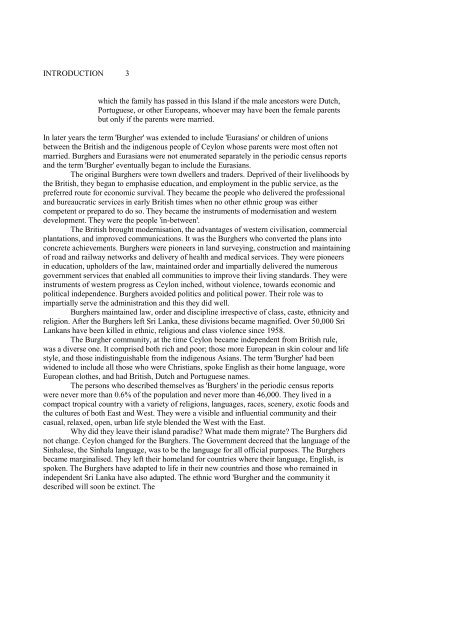Proud and prejudiced - Ferdinandus
Proud and prejudiced - Ferdinandus
Proud and prejudiced - Ferdinandus
You also want an ePaper? Increase the reach of your titles
YUMPU automatically turns print PDFs into web optimized ePapers that Google loves.
INTRODUCTION 3<br />
which the family has passed in this Isl<strong>and</strong> if the male ancestors were Dutch,<br />
Portuguese, or other Europeans, whoever may have been the female parents<br />
but only if the parents were married.<br />
In later years the term 'Burgher' was extended to include 'Eurasians' or children of unions<br />
between the British <strong>and</strong> the indigenous people of Ceylon whose parents were most often not<br />
married. Burghers <strong>and</strong> Eurasians were not enumerated separately in the periodic census reports<br />
<strong>and</strong> the term 'Burgher' eventually began to include the Eurasians.<br />
The original Burghers were town dwellers <strong>and</strong> traders. Deprived of their livelihoods by<br />
the British, they began to emphasise education, <strong>and</strong> employment in the public service, as the<br />
preferred route for economic survival. They became the people who delivered the professional<br />
<strong>and</strong> bureaucratic services in early British times when no other ethnic group was either<br />
competent or prepared to do so. They became the instruments of modernisation <strong>and</strong> western<br />
development. They were the people 'in-between'.<br />
The British brought modernisation, the advantages of western civilisation, commercial<br />
plantations, <strong>and</strong> improved communications. It was the Burghers who converted the plans into<br />
concrete achievements. Burghers were pioneers in l<strong>and</strong> surveying, construction <strong>and</strong> maintaining<br />
of road <strong>and</strong> railway networks <strong>and</strong> delivery of health <strong>and</strong> medical services. They were pioneers<br />
in education, upholders of the law, maintained order <strong>and</strong> impartially delivered the numerous<br />
government services that enabled all communities to improve their living st<strong>and</strong>ards. They were<br />
instruments of western progress as Ceylon inched, without violence, towards economic <strong>and</strong><br />
political independence. Burghers avoided politics <strong>and</strong> political power. Their role was to<br />
impartially serve the administration <strong>and</strong> this they did well.<br />
Burghers maintained law, order <strong>and</strong> discipline irrespective of class, caste, ethnicity <strong>and</strong><br />
religion. After the Burghers left Sri Lanka, these divisions became magnified. Over 50,000 Sri<br />
Lankans have been killed in ethnic, religious <strong>and</strong> class violence since 1958.<br />
The Burgher community, at the time Ceylon became independent from British rule,<br />
was a diverse one. It comprised both rich <strong>and</strong> poor; those more European in skin colour <strong>and</strong> life<br />
style, <strong>and</strong> those indistinguishable from the indigenous Asians. The term 'Burgher' had been<br />
widened to include all those who were Christians, spoke English as their home language, wore<br />
European clothes, <strong>and</strong> had British, Dutch <strong>and</strong> Portuguese names.<br />
The persons who described themselves as 'Burghers' in the periodic census reports<br />
were never more than 0.6% of the population <strong>and</strong> never more than 46,000. They lived in a<br />
compact tropical country with a variety of religions, languages, races, scenery, exotic foods <strong>and</strong><br />
the cultures of both East <strong>and</strong> West. They were a visible <strong>and</strong> influential community <strong>and</strong> their<br />
casual, relaxed, open, urban life style blended the West with the East.<br />
Why did they leave their isl<strong>and</strong> paradise? What made them migrate? The Burghers did<br />
not change. Ceylon changed for the Burghers. The Government decreed that the language of the<br />
Sinhalese, the Sinhala language, was to be the language for all official purposes. The Burghers<br />
became marginalised. They left their homel<strong>and</strong> for countries where their language, English, is<br />
spoken. The Burghers have adapted to life in their new countries <strong>and</strong> those who remained in<br />
independent Sri Lanka have also adapted. The ethnic word 'Burgher <strong>and</strong> the community it<br />
described will soon be extinct. The


